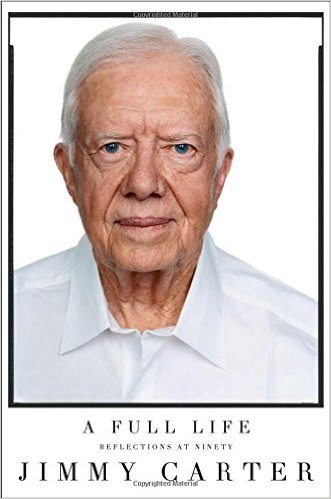By Bob Allen
Former President Jimmy Carter — nicknamed in Baptist circles the world’s most famous Sunday school teacher — says he thinks Jesus would approve of same-sex marriage.
 “I believe Jesus would approve gay marriage, but that’s just my own personal belief,” the 39th president of the United States said in an interview webcast July 7 on the Huffington Post. “I think Jesus would encourage any kind of love affair if it was honest and sincere and was not damaging to anyone else, and I don’t see that gay marriages damage anyone else.”
“I believe Jesus would approve gay marriage, but that’s just my own personal belief,” the 39th president of the United States said in an interview webcast July 7 on the Huffington Post. “I think Jesus would encourage any kind of love affair if it was honest and sincere and was not damaging to anyone else, and I don’t see that gay marriages damage anyone else.”
Carter, who on Sundays when he is in town teaches Sunday school at Maranatha Baptist Church in Plains, Ga., says he doesn’t “have any verse in scripture” to back up his opinion, but as a born-again Christian he has no problem with gay marriage.
“I think everybody should have a right to get married, regardless of their sex,” Carter said. “The only thing I would draw a line on, I wouldn’t be in favor of the government being able to force a local church congregation to perform gay marriages if they didn’t want to. But those two partners should be able to go a local courthouse or to a different church and get married.”
In a wide-ranging 30-minute interview promoting his latest book, A Full Life: Reflections at Ninety, Carter said last month’s murder of nine African-Americans attending a Bible study at Emanuel African Methodist Episcopal Church in Charleston, S.C., reminded him of his own boyhood visits to the AME church in Archery, Ga., a small farming community where he grew up surrounded by the children of African-American tenant farmers.
“I was not surprised when the parishioners there took the position of forgiving the murderer,” Carter said, describing “total forgiveness” as one of “the highest ideals of the Christian faith.”
“Christ said we must forgive people 70 times seven times, so that was not a shock to me for them to do that altruistic, natural response to a terrible tragedy,” Carter said.
Carter, who in 2008 spearheaded the New Baptist Covenant movement aimed at uniting Baptists of different races around common concerns of evangelism and social justice, said he was “deeply grieved” by the attack and hopes the church will “be healed” and emerge even stronger after the tragedy, but he was not completely surprised that such a racially motivated hate crime could occur today.
“I think we’ve seen it coming lately with the revelations about police attitudes toward African-American people,” he said. “We reached a high point, in my opinion, with the passage of civil rights legislation and the success of Martin Luther King and Andy Young and others. But I think we kind of breathed a sigh of relief as though we had finally achieved the end of racial discrimination or white supremacy in any way. Then, I think, we’ve kind of let that slide, and we ignored the inherent inclination of many people to be superior to others because of race or because of status of some kind. I believe the recent revelations about problems in Ferguson and that sort of thing plus the assassinations in Charleston have brought it back to us that we still have a long way to go. I hope that our nation will have a new resolve to correct the inherent problems that still cause discrimination against people who are African-American.”
Carter said the greatest regret of his 90 years was failure of the April 1980 military operation to rescue 52 Americans during the 444-day Iran hostage crisis.
“If we had sent one more helicopter, they would have been rescued, and I would have been re-elected,” Carter said. “I don’t have any doubt about that. I think had that happened, I would have been able to capitalize on the peace agreement in the Mideast and bring permanent peace to Israel and its neighbors.”
Carter said the Camp David Accords that he negotiated between Egyptian President Anwar Sadat and Israeli Prime Minister Menachem Begin had two main understandings. One, a peace treaty between Israel and Egypt has never been broken. The other, full autonomy and rights of the Palestinian people was supported by Begin and 85 percent of the Israeli parliament, but never implemented. “I think had I stayed in office with a deep commitment to that and deep knowledge of the issues, I could have made that a permanent thing,” Carter said.
Carter said he wasn’t being critical, but his successor Ronald Reagan wasn’t particularly interested in pursuing the Camp David Accords. Eight years later President George H.W. Bush and Secretary of State Jim Baker tried, but by then the peacemaking task had grown much harder.
“I think had I been re-elected — I have always believed sincerely and not bragging on myself — that I could have been successful in doing it,” Carter said.
